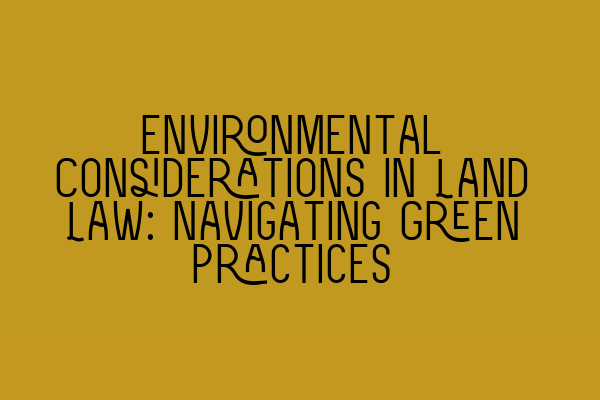Environmental Considerations in Land Law: Navigating Green Practices
As society becomes increasingly aware of the impact human activities have on the environment, it comes as no surprise that environmental considerations are now taking center stage in many areas of law, including land law. Land is not only a valuable asset but also a limited resource, and it is crucial that we approach its management with a sustainable mindset. In this blog post, we will explore the importance of environmental considerations in land law and highlight strategies for navigating green practices.
The Legal Framework
Environmental considerations in land law are guided by a comprehensive legal framework that aims to protect and preserve the natural environment. This framework includes statutes, regulations, and common law principles that play a vital role in promoting sustainable practices and minimizing the adverse impact on the ecosystem.
One of the key pieces of legislation in this area is the Environmental Protection Act 1990, which imposes a duty of care on landowners to ensure that their activities do not cause harm to the environment. The act also empowers the Environment Agency to enforce environmental standards and take action against those who violate them.
Additionally, the Town and Country Planning Act 1990 requires local planning authorities to consider the environmental impact of proposed developments before granting planning permission. This includes assessing the effects on biodiversity, air quality, water resources, and waste management.
By familiarizing themselves with the legal framework surrounding environmental considerations, solicitors can effectively advise clients on how to navigate green practices and ensure compliance with applicable laws and regulations.
Best Practices for Green Land Management
When it comes to managing land in an environmentally friendly way, there are several best practices that landowners and developers can adopt:
- Conservation and Restoration: Protecting and restoring natural habitats can contribute to biodiversity conservation and the overall health of ecosystems. This can be achieved through measures such as creating wildlife corridors, planting native species, and implementing sustainable agriculture practices.
- Energy Efficiency: Minimizing energy consumption and adopting renewable energy sources can significantly reduce carbon emissions and mitigate the effects of climate change. Landowners can explore options like solar panels, wind turbines, and energy-efficient building designs to promote green energy practices.
- Water Management: Effective water management is crucial for preserving water resources and preventing pollution. Landowners can implement strategies such as rainwater harvesting, water recycling, and responsible irrigation practices to minimize water wastage and reduce the impact on local ecosystems.
- Waste Management: Proper waste disposal and recycling can help prevent pollution and limit the use of landfill sites. Landowners should implement waste management systems that prioritize recycling and encourage responsible waste disposal practices among tenants and visitors.
- Sustainable Transport: Encouraging sustainable transport options can reduce carbon emissions and alleviate traffic congestion. Landowners can promote initiatives like bike-sharing programs, electric vehicle charging stations, and pedestrian-friendly designs to support greener transportation alternatives.
By incorporating these best practices into land management strategies, landowners can demonstrate their commitment to environmental sustainability while also reaping long-term benefits such as cost savings and increased property value.
Legal Considerations for Green Property Transactions
Environmental considerations also play a crucial role in property transactions, especially when it comes to due diligence and risk assessment. Solicitors involved in such transactions should ensure that proper environmental assessments are conducted to identify any potential contamination or issues that may affect the property’s future use or value.
Environmental indemnities and warranties are often included in contracts to allocate responsibility for present and future environmental liabilities. These provisions protect both buyers and sellers by providing financial recourse in case of environmental harm or non-compliance with environmental regulations.
Furthermore, solicitors should advise their clients on conducting thorough environmental searches and obtaining environmental reports to identify any environmental risks associated with the property. This information allows buyers to make informed decisions and potentially negotiate changes to the terms of the transaction.
Conclusion
Environmental considerations in land law are no longer optional; they are integral to sustainable land management and responsible property transactions. By understanding the legal framework, adopting best practices for green land management, and considering environmental factors in property transactions, solicitors can guide their clients towards environmentally sustainable practices that benefit both the ecosystem and their bottom line.
For more information on related legal topics, please check out our other articles:
- Interactive SQE Mock Tests for Contract Law: Test Your Knowledge
- Join Our SQE Contract Law Webinars: Expert Insights and Guidance
- Contract Law Reforms: An Analysis of Recent Changes
- Parties in a Contract: Rights and Responsibilities
- The Importance of Ethics in Contract Law: A Comprehensive Guide
At SQE Property Law & Land Law, we are committed to helping our clients navigate the complexities of land law while promoting sustainable and environmentally responsible practices. Contact us today to learn how we can assist you with your property law needs.
